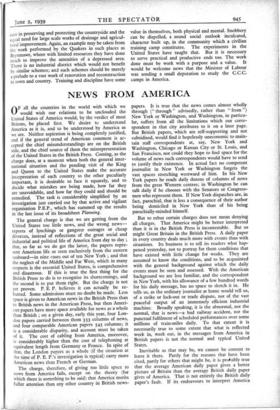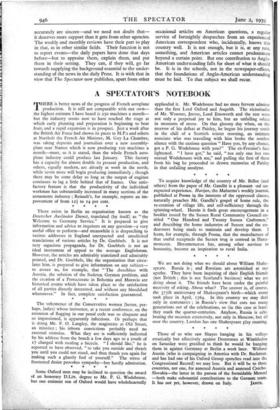NEWS FROM AMERICA
OF all the countries in the world with which we would wish our relations to be unclouded the United States of America would, by the verdict of most Britons, be placed first. We desire to understand America as it is, and to be understood by America as we are. Neither aspiration is being completely justified, and if the general trend of American comment is ac- cepted the chief misunderstandings are on the British side, and the chief source of them the misrepresentation of the United States in the British Press. Coming, as the charge does, at a moment when both the general inter- national situation and the pending visit of the King and Queen to the United States make the accurate interpretation of each country to the other peculiarly important, it is desirable to face it squarely, and to decide what mistakes are being made, how far they are unavoidable, and how far they could and should be remedied. The task is considerably simplified by an investigation just carried out by that active and vigilant organisation P.E.P., which has summed up the results in the last issue of its broadsheet Planning.
The general charge is that we are getting from the United States too little news, and the wrong news— reports of lynchings or gangster outrages or cheap divorces, instead of reflections of the great social and industrial and political life of America from day to day ; that, so far as we do get the latter, the papers repre- sent American life as seen exclusively from the eastern seaboard—in nine cases out of ten New York ; and that the neglect of the Middle and Far West, which in many respects is the essential United States, is comprehensive and disastrous. If this is true the first thing for the British Press to do is to recognise its shortcomings, and the second is to put them right. But the charge is not yet proven. P. E. P. believes it can actually be re- butted. Some admissions must no doubt be made. Less space is given to American news in the British Press than to British news in the American Press, but then Ameri- can papers have more space available for news as a whole than British ; on a given day, early this year, four Lon- don papers carried between them 333 columns of news, and four comparable American papers 545 columns; it is a considerable disparity, and account must be taken of it. The cost of cabling from America, moreover, is considerably higher than the cost of telephoning at equivalent length from Germany or France. In spite of that, the London papers as a whole (if the situation at the time of P. E. P.'s investigation is typical) carry more American news than French or German.
The charge, therefore, of giving too little space to news from America fails, except on the theory (for which there is something to be said) that America merits fuller attention than any other country in British news- papers. It is true that the news comes almost wholly through (" through " advisedly, rather than " from ") New York or Washington, and Washington, in particu- lar, suffers from all the limitations which our corre- spondent in that city attributes to it on a later page. But British papers, which are self-supporting and not subsidised, would find it hopelessly uneconomic to main- tain staff correspondents at, say, New York and Washington, Chicago or Kansas City or St. Louis, and San Francisco, nor could they hope to find space for the volume of news such correspondents would have to send to justify their existence. In actual fact no competent journalist in New York or Washington forgets the vast spaces stretching westward of him. In his New York papers he reads daily dozens of columns of news from the great Western centres; in Washington he can talk daily if he chooses with the Senators or Congress- men who represent them. If New York dispatches are, in fact, parochial, that is less a consequence of their author being domiciled in New York than of his being parochially-minded himself.
But to rebut certain charges does not mean denying all charges. That America might be better interpreted than it is in the British Press is incontestable. But so might Great Britain in the British Press. A daily paper in every country deals much more with events than with situations. Its business is to tell its readers what hap- pened yesterday, not to portray for them conditions that have existed with little change for weeks. They are assumed to know the conditions, and to be acquainted with the general background against which the daily events must be seen and assessed. With the American background we are less familiar, and the correspondent in New York, with his allowance of a few hundred words for his daily message, has no space to sketch it in. He tells us, as the ordinary journalist at home would tell us, of a strike or lock-out or trade dispute, not of the vast peaceful output of an immensely efficient industrial machine. Broadly speaking, it is the abnormal, not the normal, that is news—a bad railway accident, not the punctual fulfilment of scheduled performances over some millions of train-miles daily. To that extent it is necessarily true to some extent that what is reflected week in, week out, in the messages from America in British papers is not the normal and typical United States.
Inevitable as that may be, we cannot be content to leave it there. Partly for the reasons that have been cited, partly for others that might be, it is prchably true that the average American daily paper gives a better picture of Britain than the average British daily paper gives of America. That is not entirely the British daily paper's fault. If its endeavours to interpret America accurately are sincere—and we need not doubt that— it deserves more support than it gets from other agencies. The weekly and monthly reviews have their part to play in that, as in other similar fields. Their function is not to report events—the daily papers have done that days before—but to appraise them, explain them, and put them in their setting. They can, if they will, go far towards supplying the background essential to the under- standing of the news in the daily Press. It is with that in view that The Spectator now publishes, apart from other occasional articles on American questions, a regular service of fortnightly despatches from an experienced American correspondent who, incidentally, knows this country well. It is not enough, but it is, at any rate, something, and American articles cannot predominate beyond a certain point. But one contribution to Anglo- American understanding falls far short of what it should be. It is in the schools, not in the newspaper-offices, that the foundations of Anglo-American understanding must be laid. To that subject we shall recur.











































 Previous page
Previous page